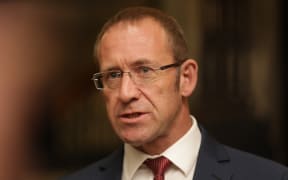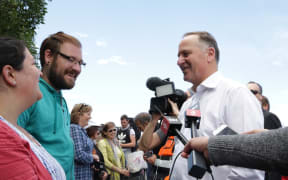Prime Minister Bill English says tax cuts are on the table but won't say how much more money people would be likely to end up taking home.
He told Morning Report's Guyon Espiner cuts would be looked at in the context of other demands, like pressure on public infrastructure, and he refused to make any promises.
Watch here:
Labour Party leader Andrew Little has ruled out tax rises if the party leads the next government.
Mr English said National's tax policy would be looked at in context of growth pressures, the need for long-term infrastructure and the need to get debt down.
He said lower- and middle-income earners were a priority.
"We're not putting forward tax cuts as some kind of sugar shock.
"It's just over time, if you've got a growing economy and surpluses you can, through a variety of mechanisms, lift incomes."
There were "a lot of choices" on how to raise household incomes, he said, but would not specify which measures.
He hinted they could come as early as next year, though.
"Most measures that you bring in to do with household income would follow the usual cycle which is, if they are announced this year, they'd start April 1 next year," Mr English said.
Labour Party finance spokesperson Grant Robertson told Morning Report the party could fund its election promises with the forecast large government surplus.
For example, its policy on three years free post-secondary-school education and training would be brought in over several years and the $1.2 billion cost spread.
"That's how we can afford it," Mr Robertson said.
Labour would take a joint approach with the Green Party on fiscal strategy, but Mr Robertson would not say whether the Greens had agreed to no tax rises.
"Their policies are their policies. What we're agreeing is an overall fiscal framework.
"There's always specific policies that people will advocate for but we will have a joint approach on the overall fiscal settings."
Mr Robertson said if Labour formed the next government, it would set up a working group to look at the tax mix, including whether wealth-based taxes such as a capital gains or land tax were needed.
That would be presented to voters at the 2020 election.
Its potential coalition partner, the Green Party, was not waiting that long.
It would release its tax policy later this year, but co-leader James Shaw said shifting the tax base to deal with climate change remained a centrepiece.
"At the last election we went in with a promise to reduce income taxes for 97 percent of people," Mr Shaw said.
"The revenue from that would have come from a charge on carbon emissions. So this year's tax package will roughly be in line with last [time's] but there will be some changes."
Mr Shaw said the Green's differences with Labour would not affect its working relationship, with the final shape of their tax policy likely to depend on the relative size of each party in Parliament.
Building up ACT's presence to influence National on issues like tax was top of mind for its leader and only MP, David Seymour.
He wanted National to commit to making tax cuts part of this year's budget, to help heavily indebted households facing the prospect of rising interest rates.
"It's all very well to talk about the government's financial situation. But what about households' financial situation," Mr Seymour said.
"We've had no tax relief for seven years, going on eight now. It's time for the government to actually look after the people who pay the bill."



